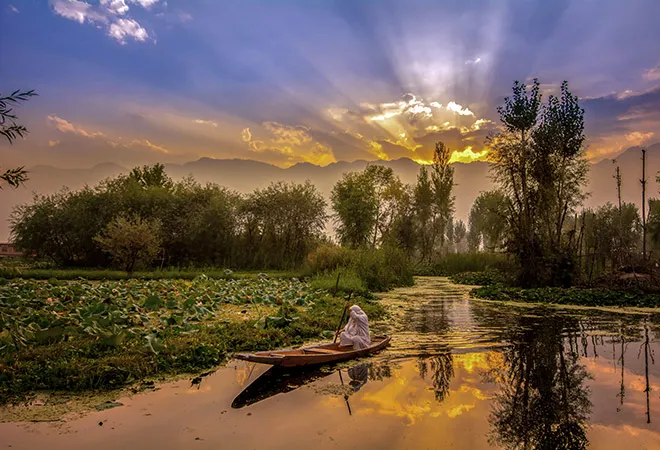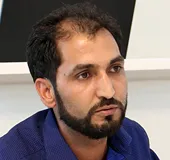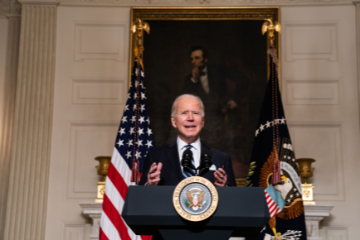
With election fever rising in Jammu and Kashmir (J&K), regional political parties have embarked on a spree of horse trading as also their age-old gimmicks to woo the deeply tormented electorate. National Conference (NC) chief and former chief minister Dr. Farooq Abdullah’s demand for the state’s “autonomy” is likely to further strengthen regionalism based on religious and ethnic identities in J&K and also further instigate the people of Kashmir against New Delhi. Given the well-known disposition of the BJP-led NDA government at the Centre on the issue of autonomy as well as the BJP’s steadfast commitment to the “abrogation” of Article 370, resorting to divisive gimmicks to grab power this time around – considering the highly charged situation in the Valley – will be disastrous for the State as well as New Delhi.
Recently, Dr. Farooq Abdullah, who is currently representing the Srinagar constituency in the Lok Sabha, promised that if his party was voted to power with full majority, he would table the autonomy resolution in the State Assembly within one month.
He made this statement at a function (20 December) to welcome expelled BJP MLA Gangan Bhagat into the party fold. It is not the first time that NC has pitched for autonomy claiming it to be the ‘only practical solution to the decades-old conflict’ and hoping that it will reap a rich electoral harvest – especially, in conflict-riddled Valley and Chenab regions. On 26 June 2000, the NC-led government, headed by Dr. Abdullah, had passed the autonomy resolution on the basis of a report prepared by nine-member State Autonomy Committee (SAC). However, on 4 July 2000, the Union Cabinet under Prime Minister Atal Bihari Vajpayee, termed the resolution as unacceptable, stating, “acceptance of this resolution would set the clock back and reverse the natural process of harmonising the aspiration of the people of Jammu and Kashmir with the integrity of the nation.”
A lot has changed in New Delhi in the past 18 years, but the BJP-led government at the Centre continues to be averse to any autonomy. Instead, the party is known to be committed for the “abrogation” of Article 370 as well as Article 35 A of the Constitution of India. Even the BJP's J&K State unit is of the view that removal of Article 370 and bringing J&K on par with other States is the only viable solution to the decades-old conflict. The autonomists, lead by NC, are of the opinion that autonomy will empower State government to utilise its strengths for addressing weaknesses. Since the decision-makers are locals, there is a greater probability that the locally-formulated government programmes will cater to the actual needs of the community in accordance with their socio-economic and cultural setup. However, NC’s ‘autonomy’ is never defined. It has remained a vogue idea that will only further escalate the tension between New Delhi and Kashmiris. Instead, the party should stress on good governance, developmental projects, infrastructure, education, health services and employment that are certain to help bring peace in conflict-riddled state of J&K. Such rhetoric, which is nothing but a form of ‘soft separatism,’ is only going to fuel further alienation, unrest and violence.
On the other hand, the BJP’s stand on J&K is tangentially different. The BJP has time and again opined that incorporation of Article 370 in the Constitution of India – which allows the J&K its own constitution and paves way only for its ‘incomplete’ merger of with the Indian Union – is the basic cause of the conflict. The BJP’s position has been reiterated even by Prime Minister Narendra Modi, who said on 30 October 2017 that what State needs is not more autonomy, but rather scrapping of Article 370.
The agenda of both the NC and the BJP will only further complicate the situation and will fuel regional and communal tendencies. The people of Jammu, a Hindu majority region, and those in the Buddhist-dominated Ladakh, will feel betrayed by New Delhi if the autonomy resolution is passed. Kashmiris, on the other hand, are bound to feel short-changed if Article 370 is abrogated. Such a stance has already created severe and deep fissures on communal lines between Jammu and the Valley. It has also created divisions on regional lines, as is being witnessed in Ladakh. The divisive politics of autonomists and nationalists neither suits New Delhi nor common Kashmiris, who, if given peace, stability and good governance, have the potential to play a constructive role in national development.
Such an “us versus them" approach of both New Delhi and local political parties has always been exploited by the separatists and Pakistan, which, through its evil designs, has kept Kashmir as well as New Delhi bleeding – not only demographically, but also economically and politically. Unabated and, in fact, increasing violence in the Valley have seen widespread bloodshed. The shameful loss of lives of innocent civilians and security forces has eroded the State’s demographic dividend – literally and figuratively. Billions of dollars are also spent every year on the security of the State. Neither NC’s autonomy will solve the problems of common Kashmiris nor will BJP’s “abrogation” of Article 370. If at all, both will fuel more regional discord and lead to increased level of separatism and alienation. The BJP’s politics over the “abrogation” of Article 370, especially at regional level, has created a conducive atmosphere for Pakistan and its proxies to radicalise the Kashmiri youth.
According to a report in India Today on 28 November this year, 247 persons were killed in 2016, while 384 were shot dead in 2017. In 2018, already 413 people have been killed. The dead include civilians, members of the security forces and militants. If the political parties at national as well as regional level do not sit across the table to discuss and deliberate how peace can be achieved, the prospect of peace and stability in the Valley will always remain a distant dream. There is an urgent need for regional parties – especially the NC and PDP – to stop living in history, and instead, focus on what they need to do to improve the situation in the Valley for the present as well as in the future. Similarly, there is also an urgent need for national parties – especially the Congress and the BJP –to stop politicisation of Kashmir. If the approach towards ‘autonomy’ and ‘abrogation’ is not changed by the respective regionalists and nationalists, the current simmering of radicalisation is bound to boil, singeing India’s national interest.
The views expressed above belong to the author(s). ORF research and analyses now available on Telegram! Click here to access our curated content — blogs, longforms and interviews.




 PREV
PREV


